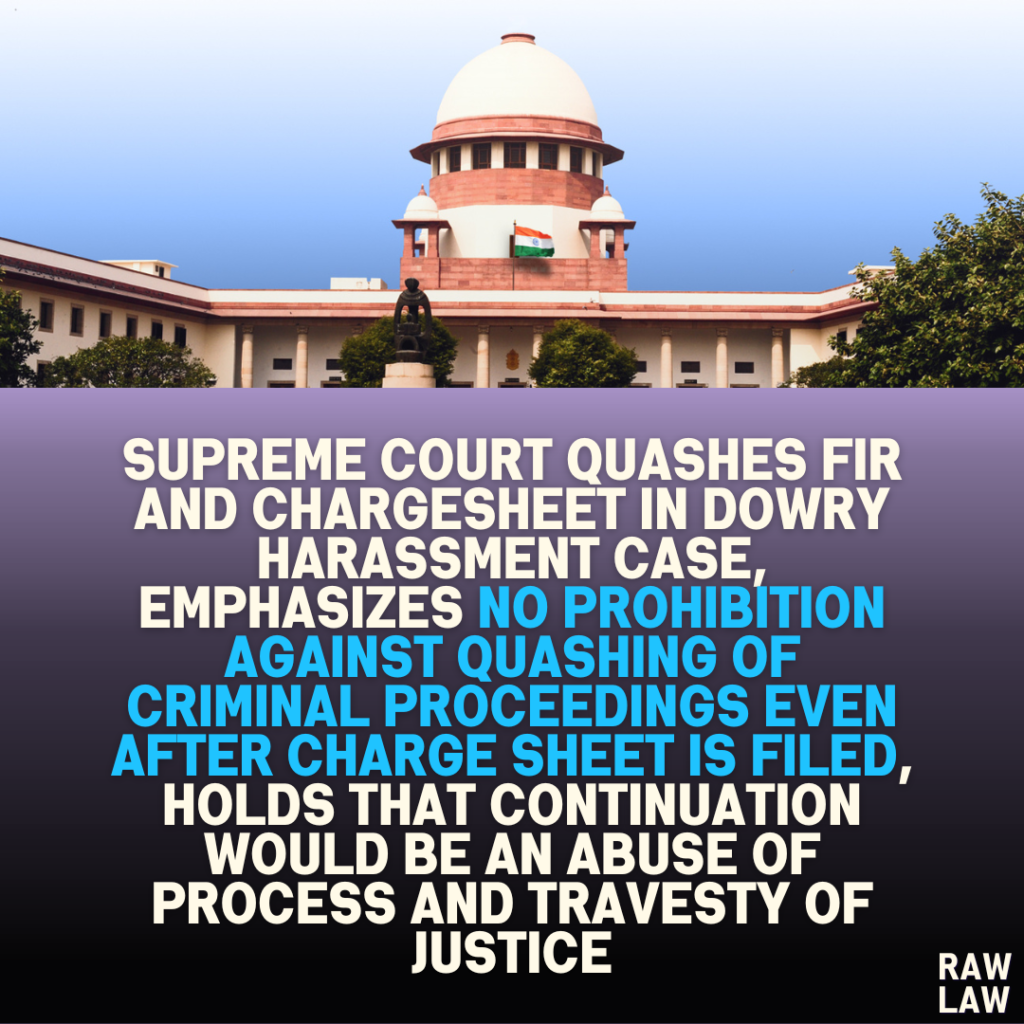Court’s Decision: The Supreme Court set aside the FIR and the subsequent chargesheet filed under Sections 498A, 323, 504, and 506 read with Section 34 of the IPC, ruling that none of the allegations in the complaint against the appellants were substantiated. The Court found that the complaint, which revolved around dowry demands and threats, lacked material details and was essentially a civil dispute cloaked as a criminal complaint. The Court quashed both the FIR and the chargesheet and allowed the appeal, stating that allowing the proceedings to continue would be an abuse of the criminal process.
Facts: The complainant, married in 2002, filed a complaint against the appellants, including her stepmother-in-law, stepbrother-in-law, father-in-law, and a family Munim, alleging dowry harassment and threats. The complaint stated that certain articles and cash were given as dowry during her marriage and that her in-laws had denied her a share in the family property and threatened her on multiple occasions. The complaint mentioned physical and mental harassment, deprivation of food, and attempts to prevent her daughter’s education. The complainant also alleged that she was threatened to bring Rs. 50,00,000 for the future of her children. Despite these claims, the complaint did not include the complainant’s husband as an accused, even though the alleged incidents involved the family business.
Issues:
- Whether the allegations in the FIR were specific and detailed enough to justify the continuation of criminal proceedings.
- Whether the High Court erred in holding that a prima facie case of cruelty under Section 498A IPC was made out against the appellants.
- Whether the FIR had jurisdiction at Jalna, considering the alleged incidents occurred in multiple locations.
Petitioner’s Arguments: The appellants argued that the allegations in the FIR were vague and lacked material particulars such as dates, times, or specific incidents. The complaint appeared to be part of a broader civil dispute between the complainant’s husband and his father over ancestral property. The appellants also pointed out that an earlier domestic violence case based on the same allegations was dismissed by the Judicial Magistrate at Jalna.
Respondent’s Arguments: The respondents contended that the complaint specifically referred to instances of cruelty and threats, and each appellant was attributed with overt acts. The High Court’s decision to uphold the FIR was based on a thorough examination of the facts, and the criminal proceedings should be allowed to continue.
Analysis of the Law: The Supreme Court highlighted that the High Court had a duty to examine the allegations with care, especially when the criminal complaint had elements of a civil dispute. The Court reiterated that criminal proceedings cannot be a shortcut to resolve civil disputes and should not be used to settle personal scores. The Court cited various precedents emphasizing that vague and general allegations, particularly in matrimonial disputes, cannot justify criminal prosecution.
Precedent Analysis: The Court referred to its earlier decisions in G. Sagar Suri v. State of U.P. and Jaswant Singh v. State of Punjab, where it cautioned against allowing criminal proceedings based on allegations that are civil in nature. The Court also cited Kahkashan Kausar v. State of Bihar and Neelu Chopra v. Bharti, which discussed the misuse of criminal law in matrimonial disputes through vague and omnibus allegations.
Court’s Reasoning: The Court found that the complaint and the subsequent chargesheet were driven by the civil dispute over property between the complainant’s husband and his father. The allegations in the FIR, such as the denial of property share, were also the subject of a civil suit filed by the complainant’s husband. The Court noted that the complaint was vague, with no specific details or evidence to substantiate the claims of cruelty. The Judicial Magistrate’s earlier dismissal of the Domestic Violence case based on the same allegations further weakened the credibility of the FIR.
Conclusion: The Supreme Court allowed the appeal, set aside the High Court’s order, and quashed the FIR and chargesheet. The Court ruled that the criminal proceedings were manifestly frivolous and were initiated to harass the appellants in the context of the ongoing civil dispute. The Court emphasized that the continuation of these proceedings would be a travesty of justice.
Implications: This ruling reaffirms that criminal law cannot be used as a tool to settle civil disputes or personal vendettas. The decision sets a precedent for courts to exercise caution in allowing criminal proceedings based on vague allegations, particularly in cases involving matrimonial or property disputes. It underscores the importance of distinguishing between genuine cases of harassment and those filed with ulterior motives.




Pingback: Allahabad High Court Sets Aside Money Decree Against Bank – "Observes Wrongful Payment Not Proved by Adequate Evidence" - Raw Law